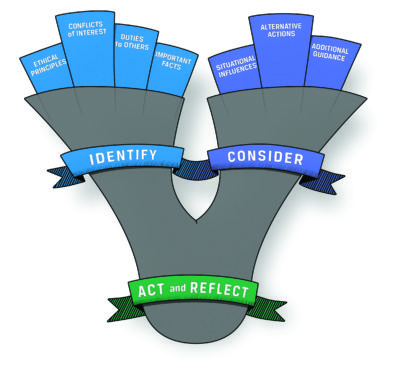Ethics in Practice: Do What I Do for Investment Success! Case for Week of 6 November
Analysis now posted. See below.
It is time for this week’s ethical workout. Keep Reading!
Case
Svetlana works for a publishing company writing an online financial newsletter that describes her investment philosophy and identifies intriguing investment opportunities. She is paid a salary plus incentive bonuses for every new subscriber. Svetlana routinely states that she makes $5,000 in investment returns every week, and that if readers followed her advice, they could too. Svetlana often includes success stories from readers, including the story of a reader who turned $200 into $1 million in six months using Svetlana’s investment techniques. Svetlana’s actions are
- acceptable because subscribers to her newsletter are not clients.
- acceptable because she is not guaranteeing investment success.
- unacceptable unless she includes stories of readers who followed her investing philosophy and were not successful.
- D. unacceptable if the investments are unsuitable for her subscribers.
Analysis
This case involves potential misrepresentation. CFA Institute Standard I(C): Misrepresentation states that members “must not knowingly make any misrepresentations relating to investment analysis, recommendations, actions, or other professional activities.” This includes statements relating to past investment performance history. Does Svetlana misrepresent her past performance record and the success of her investments? That is not clear. Her statements regarding her weekly investment returns and the success stories of readers who follow her advice may be true. More facts are necessary. Assuming those statements are true, it is irrelevant whether she is making the statements to clients, potential clients, subscribers to her newsletter, or the investing public. Standard I(C) prohibits any misinformation regardless of the audience, so answer A is not correct. There is also no requirement that Svetlana include statements in her articles that counterbalance her claims (Answer C). It would be up to the interested person to inquire more deeply about her performance record to gauge its veracity. Svetlana would be required to respond truthfully to probing questions, such as “how many readers using your investment techniques have lost money?” And because there is no investment advisory relationship between Svetlana and those who may read her articles, she is not required to conduct a suitability analysis of the investments for anyone reading her newsletter (Answer D). (Although best practice would dictate that Svetlana include some general cautionary language in her articles recommending that readers ensure any investments they make are suitable to their financial goals, constraints, and circumstances). Finally, Standard I(C) prohibits members from guaranteeing clients any specific return on investments because most investments contain some element of risk that makes their return inherently unpredictable. But Svetlana does not provide guarantees because she qualifies her statements about expected performance by asserting that readers following her investment philosophy “could” earn regular returns; she doesn’t guarantee that they will. Answer B is correct.
This question was based on facts from a CFA Institute Professional Conduct enforcement action.
Have an idea for a case for us to feature? Send it to us at [email protected].
More About the Ethics in Practice Series
Just as you need to practice to become proficient at playing a musical instrument, public speaking, or playing a sport, practicing assessing and analyzing situations and making ethical decisions develops your ethical decision-making skills. To promote “ethical exercise,” we are excited to introduce Ethics in Practice.
Each week, we post a short vignette, drawn from real-world circumstances, regulatory cases, and CFA Institute Professional Conduct investigations, along with possible responses/actions. We then encourage you to assess the case through the lens of the Ethical Decision-Making Framework and the CFA Institute Code of Ethics and Standards of Professional Conduct and let us know which of the choices you believe is the right thing to do and why. If you are not a CFA Institute member, you can post your choice and reasoning in the comments section below. For CFA Institute members, we would like you to join the conversation in our new Member App and post your responses there. Later in the week, we will post an analysis of the case and you can see how your response compares.
CFA Institute Member App
The Member App gives CFA Institute members access to a content from multiple CFA Institute publications, including these weekly Ethics in Practice posts. Best of all, the app allows in-app submission of Continuing Education credits, which members can earn by reading and participating in the conversation for each case. (0.25 CE, 0.25 SER). The app is available in the Apple and Google Play stores. After downloading, simply log in using your CFA Institute website credentials (e.g., [email protected] + password). Hint: Save the post to your library in the app to find it easily.
If you liked this post, consider subscribing to Market Integrity Insights.
Image Credit: ©CFA Institute


D. unacceptable if the investments are unsuitable for her subscribers.
Because she should write the true, I understand because she do, but the point is what would she think if somebody says to her that if she invest on a instrument she will increases her patrimony and it is not like that
This story is similar as what Enron did when it was breaking, but she does not know if the instruments are good or not, but the texture does not mean that she is qualified to be a broker
Regards